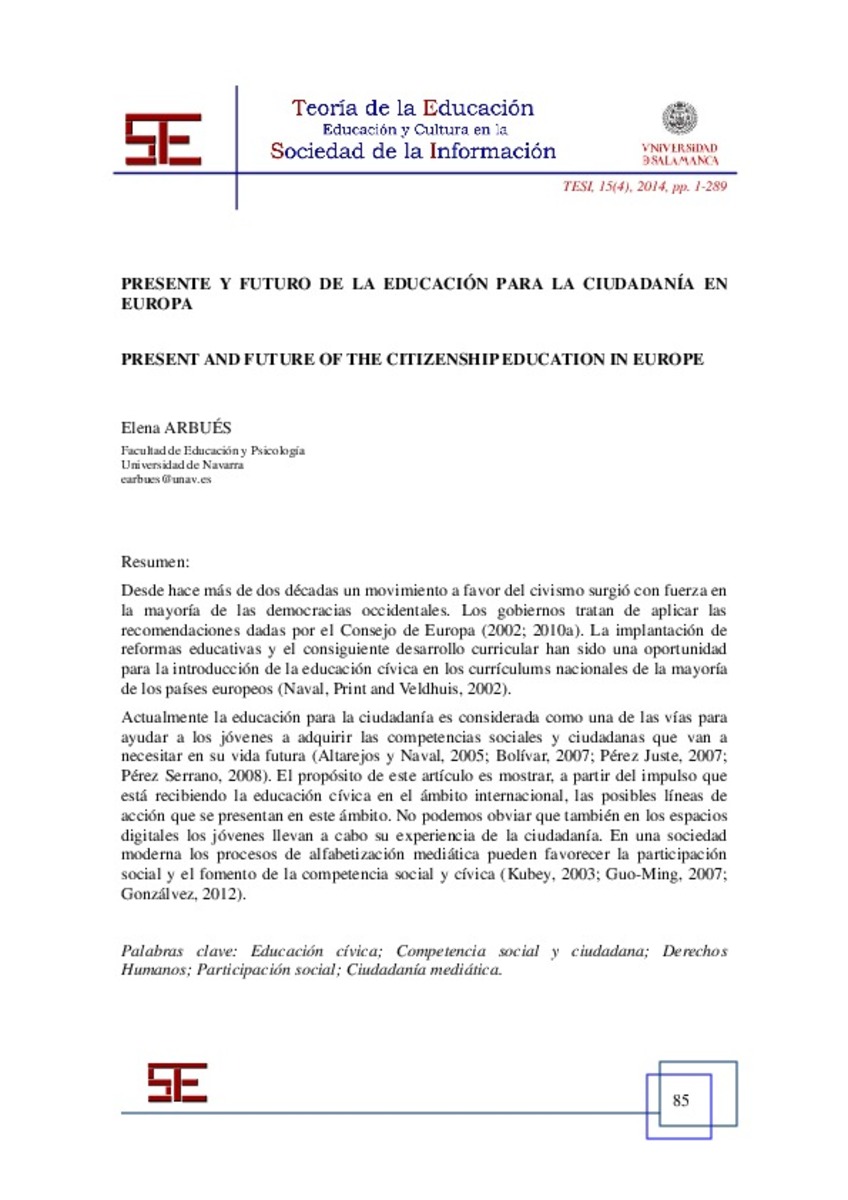Full metadata record
| DC Field | Value | Language |
|---|---|---|
| dc.creator | Arbués, E. (Elena) | es_ES |
| dc.date.accessioned | 2016-12-20T09:28:16Z | - |
| dc.date.available | 2016-12-20T09:28:16Z | - |
| dc.date.issued | 2014 | es_ES |
| dc.identifier.citation | Arbués, E. (2015). Presente y futuro de la educación para la ciudadanía en Europa. Education In The Knowledge Society (EKS), 15(4), 85-106 | - |
| dc.identifier.issn | 1138-9737 | - |
| dc.identifier.uri | https://hdl.handle.net/10171/42557 | - |
| dc.description.abstract | For over two decades, civic movements have emerged strongly in most of the Western demo -cracies. Governments have been attempt ing to implement the various recommendations of the Council of Europe (2002; 2010a). The introduction of educational reforms and the ongoing development of curricula have provided an opportunity to include civic education in the national curriculum of most of the European countries (Naval, Print & Veldhuis, 2002). Currently citizenship education is considered as one way to help young people to acquire the social and citizenship competencies required for the future life (Altarejos y Naval, 2005; Bolívar, 2007; Pérez Juste, 2007; Pérez Serrano, 2008) . This paper aims to display , given the impulse that civic education is getting internationally, the possible future tendencies i n this research area. Additionally, we can not ignore that young people also go through with their experience of citizenship in d igital spaces. In a modern society the media literacy processes may promote the social participation and the promotion of social and civic competence s (Kubey, 2003; Guo -Ming, 2007; Gonzálvez, 2012). | - |
| dc.description.abstract | Desde hace más de dos décadas un movimiento a favor del civismo surgió con fuerza en la mayoría de las democracias occidentales . Los gobiernos tratan de aplicar las recomendaciones dadas por el Consejo de Europa (2002; 2010a ). La implantación de reformas educativas y el consiguiente desarrollo curricular han si do una oportunidad para la introducción de la educación cívica en los currí culums nacionales de la mayoría de los países europeos (Naval, Print and Veldhuis, 2002). Actualmente la educación para la ciudadanía es considerada como una de las vías para ayuda r a los jóvenes a adquirir las competencias sociales y ciudadanas que van a necesitar en su vida futura ( Altarejos y Naval, 2005; Bolívar, 2007; Pérez Juste, 2007; Pérez Serrano, 2008) . El propósito de este artículo es mostrar, a partir del impulso que est á recibiendo la educación cívica en el ámbito internacional, las posibles líneas de acción que se presentan en este ámbito. No podemos obviar que también en los espacios digitales los jóvenes llevan a cabo su experiencia de la ciudadanía. E n una sociedad moderna l os procesos de alfabetización mediática pueden favorecer la participación social y el fomento de la competencia social y cívica ( Kubey, 2003; Guo -Ming, 2007; Gonzálvez, 2012). | - |
| dc.language.iso | spa | - |
| dc.rights | info:eu-repo/semantics/openAccess | - |
| dc.subject | Social participation | - |
| dc.subject | Social and civic competence | - |
| dc.subject | Ciudadanía mediática | - |
| dc.subject | Derechos humanos | - |
| dc.subject | Educación cívica | - |
| dc.subject | Competencia social y ciudadana | - |
| dc.subject | Participación social | - |
| dc.subject | Civic education | - |
| dc.subject | Human Rights | - |
| dc.subject | Media citizenship | - |
| dc.title | Presente y futuro en el ámbito de la educación para la ciudadanía en Europa | es_ES |
| dc.type | info:eu-repo/semantics/article | es_ES |
Files in This Item:
Statistics and impact
Items in Dadun are protected by copyright, with all rights reserved, unless otherwise indicated.






